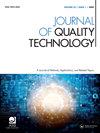Predictive Control Charts (PCC): A Bayesian approach in online monitoring of short runs
IF 2.6
2区 工程技术
Q2 ENGINEERING, INDUSTRIAL
引用次数: 2
Abstract
Abstract Performing online monitoring for short horizon data is a challenging, though cost effective benefit. Self-starting methods attempt to address this issue adopting a hybrid scheme that executes calibration and monitoring simultaneously. In this work, we propose a Bayesian alternative that will utilize prior information and possible historical data (via power priors), offering a head-start in online monitoring, putting emphasis on outlier detection. For cases of complete prior ignorance, the objective Bayesian version will be provided. Charting will be based on the predictive distribution and the methodological framework will be derived in a general way, to facilitate discrete and continuous data from any distribution that belongs to the regular exponential family (with Normal, Poisson and Binomial being the most representative). Being in the Bayesian arena, we will be able to not only perform process monitoring, but also draw online inference regarding the unknown process parameter(s). An extended simulation study will evaluate the proposed methodology against frequentist based competitors and it will cover topics regarding prior sensitivity and model misspecification robustness. A continuous and a discrete real data set will illustrate its use in practice. Technical details, algorithms, guidelines on prior elicitation and R-codes are provided in appendices and supplementary material. Short production runs and online phase I monitoring are among the best candidates to benefit from the developed methodology.预测控制图(PCC):短期运行在线监测中的贝叶斯方法
对短视距数据进行在线监测是一项具有挑战性的工作,但具有成本效益。自启动方法试图通过同时执行校准和监测的混合方案来解决这个问题。在这项工作中,我们提出了一种贝叶斯替代方案,该方案将利用先验信息和可能的历史数据(通过功率先验),在在线监测中提供领先优势,重点放在异常值检测上。对于完全先验无知的情况,将提供客观的贝叶斯版本。图表将基于预测分布,方法框架将以一般方式导出,以方便来自任何属于规则指数族的分布的离散和连续数据(以正态分布,泊松分布和二项式分布为最具代表性)。在贝叶斯领域,我们不仅可以进行过程监控,还可以对未知的过程参数进行在线推断。一项扩展的仿真研究将对基于频率主义者的竞争对手评估所提出的方法,并将涵盖有关先验灵敏度和模型错配鲁棒性的主题。一个连续和离散的实际数据集将说明它在实践中的应用。技术细节、算法、预先引出和r码的指南在附录和补充材料中提供。短期生产运行和在线第一阶段监测是从开发的方法中受益的最佳候选。
本文章由计算机程序翻译,如有差异,请以英文原文为准。
求助全文
约1分钟内获得全文
求助全文
来源期刊

Journal of Quality Technology
管理科学-工程:工业
CiteScore
5.20
自引率
4.00%
发文量
23
审稿时长
>12 weeks
期刊介绍:
The objective of Journal of Quality Technology is to contribute to the technical advancement of the field of quality technology by publishing papers that emphasize the practical applicability of new techniques, instructive examples of the operation of existing techniques and results of historical researches. Expository, review, and tutorial papers are also acceptable if they are written in a style suitable for practicing engineers.
Sample our Mathematics & Statistics journals, sign in here to start your FREE access for 14 days
 求助内容:
求助内容: 应助结果提醒方式:
应助结果提醒方式:


